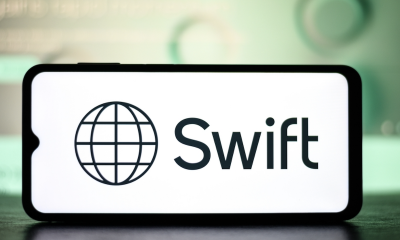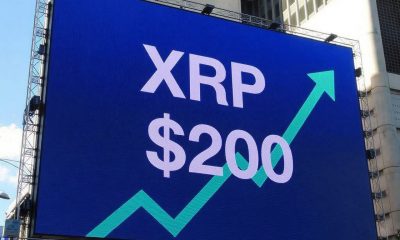

Technology
Quantum Computing Nabs Nobel for Physics – Crypto News
-

 Cryptocurrency1 week ago
Cryptocurrency1 week agoChainlink expands industry initiative with 24 banks to cut $58B corporate actions cost – Crypto News
-
others1 week ago
David Schwartz To Step Down as Ripple CTO, Delivers Heartfelt Message to XRP Community – Crypto News
-

 Blockchain1 week ago
Blockchain1 week agoCrypto Must Stop Using ‘Misleading’ mNAV Metric: NYDIG – Crypto News
-

 Technology1 week ago
Technology1 week agoEngineers are chasing ₹30 lakh offers—but not from startups – Crypto News
-

 Technology7 days ago
Technology7 days agoEinride Raises $100 Million for Road Freight Technology Solutions – Crypto News
-

 others1 week ago
others1 week agoUSD/JPY strengthens to near 149.50 as US PCE data reinforces Fed dovish bets – Crypto News
-

 Blockchain1 week ago
Blockchain1 week agoXRP Price Is About To Close A 3M Candle Above This Major Region, Here’s What It Means For Price – Crypto News
-
others1 week ago
Dogecoin Price Prediction – Chart Set-Up Highlights Perfect Buying Opportunity With Outflows Backing $0.45 – Crypto News
-

 Technology1 week ago
Technology1 week agoQNT soars 7% as Quant ignites banking revolution with QuantNet release – Crypto News
-

 Blockchain1 week ago
Blockchain1 week agoCiti Integrates Token Services Platform With Clearing Solution – Crypto News
-

 Cryptocurrency1 week ago
Cryptocurrency1 week agoBitcoin’s Cheat Code? 50 EMA Could Decide BTC’s Price in Q4 – Crypto News
-

 others1 week ago
others1 week agoGBP/USD rises as Fed rate cut bets grow, US shutdown risks loom – Crypto News
-

 Technology1 week ago
Technology1 week agoWhich ChatGPT features are restricted under parental controls introduced by OpenAI? – Crypto News
-
Technology1 week ago
Bloomberg Analyst Says XRP ETF Approval Odds Now 100% as Expert Eyes $33 Rally – Crypto News
-
Technology1 week ago
Fed’s Goolsbee Cites Inflation Worries in Case Against Further Rate Cuts – Crypto News
-
others1 week ago
Ireland AIB Manufacturing PMI increased to 51.8 in September from previous 51.6 – Crypto News
-

 Cryptocurrency1 week ago
Cryptocurrency1 week agoBitcoin’s rare September gains defy history: Data predicts a 50% Q4 rally to 170,000 dollars – Crypto News
-
Business1 week ago
LBank Celebrates 10 Years With Bold Achievements and Global Expansion – Crypto News
-
Business1 week ago
LBank Celebrates 10 Years With Bold Achievements and Global Expansion – Crypto News
-
Technology1 week ago
Breaking: BNB Chain Account Hacked With Founder CZ Shown Promoting Meme Coin – Crypto News
-

 Blockchain1 day ago
Blockchain1 day agoIt’s About Trust as NYSE Owner, Polymarket Bet on Tokenization – Crypto News
-
Metaverse1 week ago
Ex-Google CEO Eric Schmidt feels US is lagging in the AI race, while China has THESE advantages | 5 points – Crypto News
-
others1 week ago
Aster Price Prediction as US President Adds $110M Worth of Tokens to His Portfolio – Crypto News
-
Technology1 week ago
Breaking: Strategy Buys 196 Bitcoin as Michael Saylor Says ‘Always Be Stacking’ – Crypto News
-

 Technology1 week ago
Technology1 week agoUS SEC weighs tokenised stock trading on crypto exchanges – Crypto News
-

 Blockchain1 week ago
Blockchain1 week agoWatch These Key Bitcoin Metrics as BTC Price Prepares for ‘Big Move’ – Crypto News
-

 others1 week ago
others1 week agoGold rises as US PCE inflation data fuels Fed rate cut hopes – Crypto News
-
Business1 week ago
Breaking: SWIFT, Banks, & Consensys Announce Shared Blockchain Ledger for Global Payments – Crypto News
-
others1 week ago
French Finance Insider Buys $48.9M in XRP, Expert Hints at Bullish Move Ahead – Crypto News
-
Business1 week ago
Bitcoin Price Set to Rebound Ahead of US Government Shutdown, NFP Data – Crypto News
-

 Blockchain1 week ago
Blockchain1 week agoThe Bullish Pattern That Suggests New Highs – Crypto News
-

 Blockchain1 week ago
Blockchain1 week agoTrump Pulls Brian Quintenz Nomination for CFTC – Crypto News
-

 Cryptocurrency1 week ago
Cryptocurrency1 week agoXPL, Not XRP: Why Are Whales Shoveling Ripple’s Rival? – Crypto News
-

 Blockchain1 week ago
Blockchain1 week agoSwift Adding Blockchain-Based Shared Ledger to Infrastructure – Crypto News
-

 Cryptocurrency1 week ago
Cryptocurrency1 week agoBitcoin Bounces as Crypto Market Turns Green: Where Do Prices Go Next? – Crypto News
-

 Technology1 week ago
Technology1 week agoNasdaq-listed Helius Medical Technologies rebrands as Solana Company – Crypto News
-

 Cryptocurrency1 week ago
Cryptocurrency1 week agoCrypto Market Prediction: Shiba Inu (SHIB) Moon Landing, Dogecoin (DOGE) Trapped in $0.23, XRP: Most Important Event for $3 – Crypto News
-
Cryptocurrency1 week ago
BREAKING: BlackRock Amends Bitcoin ETF (IBIT), Ethereum ETF (ETHA) Amid New Milestone – Crypto News
-

 Cryptocurrency1 week ago
Cryptocurrency1 week agoHorizen (ZEN) gains 12% to break above $7 – Crypto News
-

 De-fi1 week ago
De-fi1 week agoCrypto Market Slips as U.S. Government Shutdown Looms – Crypto News
-

 Technology6 days ago
Technology6 days agoCAKE eyes 60% rally as PancakeSwap hits $772B trading all-time high – Crypto News
-
Technology1 week ago
Crypto ETFs Approval Faces Uncertainty as Government Shutdown Looms, Bloomberg Analyst Says – Crypto News
-
others1 week ago
Fed’s Hammack Backs Restrictive Policy Over Rate Cuts Amid Inflation Concerns – Crypto News
-

 De-fi1 week ago
De-fi1 week agoAndre Cronje’s Flying Tulip Raises $200 Million Ahead of ICO – Crypto News
-
others1 week ago
Japan Tankan Large All Industry Capex climbed from previous 11.5% to 12.5% in 3Q – Crypto News
-
Technology1 week ago
Experts Say Bitcoin CME Gap Brings Short Term Uncertainty Before Uptober Rally Begins – Crypto News
-
Technology1 week ago
Breaking: Strategy Buys 196 Bitcoin as Michael Saylor Says ‘Always Be Stacking’ – Crypto News
-

 Blockchain1 week ago
Blockchain1 week agoAnalyst Outlines Longevity And Bold $200 Target – Crypto News
-

 others1 week ago
others1 week agoEUR/GBP supported by dovish BoE tone and persistent UK fiscal headwinds – Crypto News
-

 De-fi1 week ago
De-fi1 week agoHyperliquid’s Hypurr NFTs Settle at $55,000 Floor Amid Ecosystem Expansion – Crypto News












